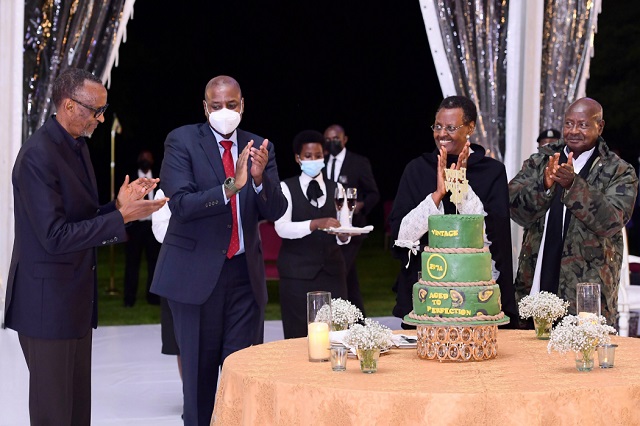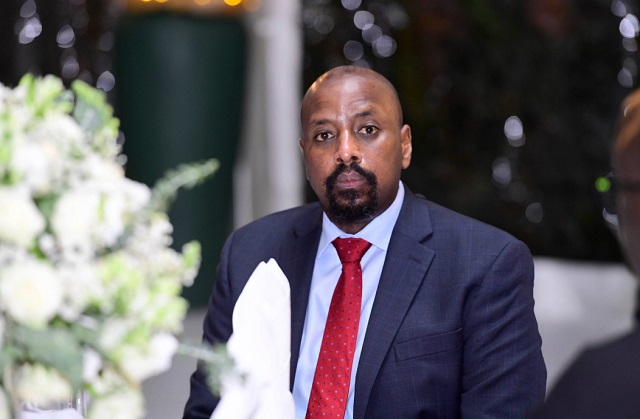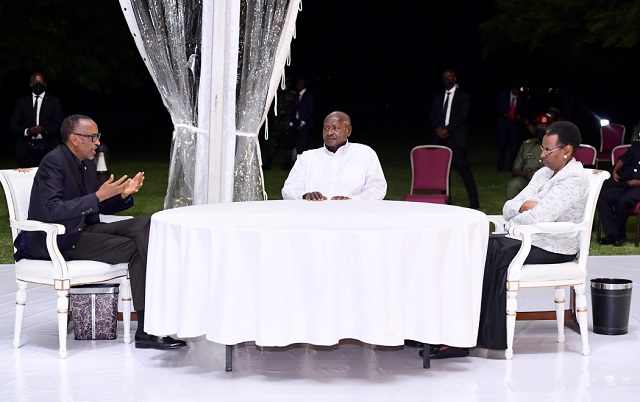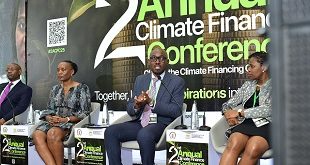
Why crowd wanted him anointed but Museveni wasn’t baited
Kampala, Uganda | MUBATSI ASINJA HABATI | The weekend of 23 April, saw a number of activities to mark the 48th birthday of the First Son, Lt. Gen. Muhoozi Kainerugaba, who is commander of UPDF Land Forces.
There were a few mini-fetes in parts of the country but the main activities started with a marathon flagged off by the man himself at Kololo Independence Grounds, then a state-level music concert at Lugogo Cricket Oval, a football match between UPDF generals and Members of Parliament, and a dinner for the birthday boy hosted at State House Entebbe with the President, Gen.Yoweri Museveni and his Rwandan counterpart, Gen. Paul Kagame and Muhoozi’s friends and associates, and government officials in attendance.
Gen. Muhoozi was born on April 24, 1974, according to official records.
The state expenditure on a private birthday did not go unnoticed. Many were questioning the use of public resources on such a function. Dr Mwambutsya Ndebesa, a history don at Makerere University thinks a lavish party sponsored by the state was not a great idea given the economic distress many Ugandans are not able to buy essential commodities such as soap.
“When citizens are sacrificing, their state is extravagantly spending. This is a time when the state should be practicing austerity measures to reduce government budget spending so as to subsidize say fuel. Muhoozi should be celebrating his birthday in either Congo or Karamoja or Somalia in a low key ceremony with his troops not in Kampala spending a lot of state funds in this period which needs austerity. May be IMF is right to impose austerity measures on us because our government has no financial discipline even in times of economic stress,” Ndebesa said.
But State House appeared to be at pains to explain that the activities were organized by friends of Muhoozi, the so-called “Patriots.”

Hidden motives
At the birthday fete, the main celebrants kept their cards hidden. While crowds of excited revelers at the birthday fetes were shouting “Our next president, our next president,” the birthday boy remained tight-lipped on his rumoured presidential ambitions.
Instead, Muhoozi heaped boyish flattery on his elders, Museveni waxed sentimentality, and Kagame opted for an austere demeanor.
Museveni said that Muhoozi’s birth was a gift to the freedom fighters during their early days of the struggle.
“Muhoozi was a gift for us in our young days of the struggle,” Museveni said.
Where President described how he cautioned Gen. Muhoozi about his tweets; especially those that could affect Uganda’s relations with other countries, Gen. Kagame reportedly jokingly offered to edit Muhoozi tweets.
“There is something positive about his tweets, because he tweets about his passion, on this and that. But the problem is that you should not externalize your passion. Work on the issues of the tweets and the surroundings of the tweets,” he said.
Museveni also spoke of how he advised Muhoozi to join the army immediately after university. He said it was not so that Muhoozi could get a job. But so that he can develop his character.
“Many countries in Africa have got security problems because of the structure of their armies. People like Muhoozi joined the army not because of a job but because of his passion. That’s why Muhoozi has made some contribution to the building of the UPDF,” the President said.
Speaking to a cheering audience, President Kagame congratulated Gen Muhoozi for clocking 48 years and said “there are many expectations” around him.
“Forty-eight years means he has been here for some time but also means he is still very young. The question is how he has lived his time and how he intends to use his remaining time. There is no doubt, that many more years that are ahead, he will use them even better. I want also to say to Gen Muhoozi that there (are) a lot of expectations that you continue that path you have taken,” President Kagame said.
“I had not been coming to Uganda and the expectation I talked about earlier is based on the history we share together. There have been difficulties between our two countries, but I was convinced that these were going to be temporary. The ties that bind us together are strong and big,” Kagame said.
The Rwandan President revealed that when he received Muhoozi in Rwanda recently, he knew that the President of Uganda was behind his visit and the message.
“When we talked, the conversation was for peace for our country. I am convinced that great generals are not only those who fight and win battles but also those who fight and win peace,” he said.
On his part, the birthday general, Muhoozi saluted President Kagame for gracing the function.
“I want to thank in a very special way Paul Kagame for honouring my invitation to come and grace this occasion. We know it is the beginning of many more good things to come. President Kagame is a very open and honest man. He is honest and straight forward,” he said.
Muhoozi added that an honest interaction with Kagame is what has helped Uganda and Rwanda negotiate a path back to friendship.
All the while, the excited crowd of revelers was shouting “Our next president, our next president.” But father and son, and uncle looked on as expressionlessly as all great generals would.

Muhoozi wins, loses
Muhoozi’s intervention is being seen as a double-edged sword.
Some political observers have likened Muhoozi’s entry into the on-and-off diplomatic tiffs between Museveni and Kagame to attempting to tame a leopard. One can never say one will not be bitten.
President Kagame’s visit was a surprise as it comes after four years of frosty relationships between Uganda and Rwanda. According to a diplomatic note issued, Kagame had visited Uganda to hold bilateral talks to discuss the security situation in Democratic Republic of Congo (DRC), and to attend the birthday anniversary of Muhoozi.
In recent months, Lt. Gen. Muhoozi had been hopping on and off the plane to Kigali in a diplomatic frenzy to mend relations between the two countries.
Muhoozi, who is reportedly being groomed to succeed his father who has been in power since 1986, said he was celebrating partly because of improved relations between both countries.
“We were experiencing bad relations with one of our closest and brotherly neighbours, Rwanda,” Kainerugaba said. “Our relations are good now and are going to even get better. That’s why I think we should celebrate together.”
Muhoozi has been at the centre of attempts to mend relations between both countries, having visited Rwanda twice in the past two months and held talks with Kagame.
Those visits led to the partial re-opening of the Gatuna border in northwestern Rwanda, the busiest border point between the two countries, which Kagame had closed in January 2019. The relationship between Uganda and Rwanda had been frosty since 2018 and Rwanda closing its Gatuna border with Uganda marked the peak bad-blood. Both states deployed military personnel at border points in anticipation of attacks; Rwandan accused Kampala of hosting citizens considered hostile to Kigali and vice versa.
Over the nearly 3-year border closure, Rwanda maintained a shoot-to-kill policy on any Ugandan caught on the Rwandan side. Many were killed, including six Ugandans killed by Rwanda soldiers for allegedly trying to smuggle goods across the border.
The diplomatic strain particularly hit hard businesses at the border, which depended on daily movement of people and goods. Nationally, the Ugandan Ministry of Trade estimated a loss of approximately US $200m in export earnings to its neighbour across one year, because of Kagame’s decision to close the border. The Kigali economy reportedly suffered heavier losses.
But before the birthday fete, Museveni and Kagame had met in Nairobi on the sidelines of the EAC Heads of State Summit to officially admit Democratic Republic of Congo in the east African bloc.
During the April 24 birthday activities at State House Entebbe, President Museveni is said to have appreciated the friendship between Muhoozi and Kagame which might have eased the official relations between the two presidents and countries by extension.
Ties between Museveni and Kagame date back to the late 1970s. When Museveni along with 27 rebels launched a bush war in 1981, Kagame and many Rwandan refugees in Uganda joined the war that brought Museveni to power five years later.
At the fun-filled dinner that President Museveni organised for his son, he expressed his happiness for the attendance of President Kagame.
“We are very happy that you came. Thank you for responding positively to Muhoozi’s invitation and you came. President Kagame is an old friend since way back in 1979. Kagame was among the group with whom I attacked Kabamba. When you hear about the 27 guns we started with, there was Fred Rwigyema, Paul Kagame and others. That time Muhoozi was only five years old,” President Museveni said.
Even after the National Resistance Army (NRA) war a number of Rwandans held key positions in Museveni’s government until 1992, when Kagame and other Rwandan refugees launched a war that resulted in him capturing power in his homeland.
The Museveni-Kagame relationship has oscillated up and down since 1992 when Kagame assumed leadership of the Rwanda Army after the death of Fred Rwigyema. Some analysts have said the disagreements between the two heads of state are ideological, military and a feeling of lack of respect for each other.
Others have argued that the disagreement dates back to the 1980s, when Rwandan refugees felt they were never truly accepted and appreciated for their role in Museveni’s ascendancy to power.
Signs of deterioration in their relationship came in 1999. Their armies fought each other in Kisangani, eastern Democratic Republic of Congo (DRC) after disagreeing on a strategy of deposing its leader Laurent Kabila whom they had helped to install as head of state in 1997.
In 2000, Uganda officially declared Rwanda a hostile state. It took the diplomatic intervention of Clare Short, the then British minister for international development, to get the duo back on good terms.
Tensions flared again in 2005 when Kampala felt Kigali had disrespected Museveni by forcing him to drastically reduce his security detail during the COMESA summit in Kigali. Kagame, in turn, cancelled a visit to Kampala without notice, leaving senior government officials who waited for him at the airport baffled.
The most recent episode of the squabble began in 2018 when Rwanda accused Uganda of giving sanctuary to dissident groups. In response, Uganda accused Rwanda of espionage.
Muhoozi had dropped his military uniform and put a diplomatic suit and visited the man he calls “uncle” the president of Rwanda. But he has gathered few friends in Ministry of ForeignAffairs and official diplomatic circles for allegedly undermining the diplomatic institutions of Rwanda and Uganda with his forays. They say Rwanda could be viewing Muhoozi as the president’s son not as a Ugandan government official.
On his part, Muhoozi’s visit to Kigali led to the removal of an army intelligence chief who was viewed as anti-Kigali and he has reportedly vowed to crash anti-Rwanda elements who dare try to establish bases in Uganda.
The reported presence on Ugandan soil of rebels seeking to topple Kagame has been a long-running tense relations between the two neighbours.
Kagame’s visit comes weeks after Uganda announced the deportation of a leading figure belonging to the banned opposition group Rwanda National Congress (RNC), which Kigali considers a “terrorist” outfit.
After his visit to Rwanda, Muhoozi had promised to crack down on the RNC, which was founded in 2010 by former Rwandan army chief Kayumba Nyamwasa and ex-spy boss Patrick Karegeya who both became fierce Kagame critics.
But the political analysts argue that, from the Rwandan perspective, stabilizing relations between the two countries will depend on how Kigali views Uganda’s response to its security interests, and less on how much cake they are served at birthday parties in Kampala.
****
 The Independent Uganda: You get the Truth we Pay the Price
The Independent Uganda: You get the Truth we Pay the Price




Romans 12:18 KJV
If it be possible, as much as lieth in you, live peaceably with all men.
Peace between neighbors is paramount and worth achieving. O that warring parties namely USA-NATO and their proxy Ukraine all against Russia would borrow leaf and seek peace.
On March 11, 2006 Andrew Mwenda wrote:
“The crowning moment of this journey was two weeks ago when President Yoweri Museveni appointed his wife, Mrs Janet Museveni, to cabinet. That there has not been a major outcry in the country against this increasing and narrowing patrimony is a sign of how deeply people’s expectations of the president have sunk. Short of walking nude on the streets of Kampala, there is really nothing that Museveni can do that can shock anyone anymore. Whenever I think he has reached the rock-bottom of moral and political depravity, Museveni somehow still finds a new depth to fall into”
“In such circumstances, the paranoia of an Idi Amin, Jean Bokasa and Samuel Doe can lay a country to ruins. Equally, the charisma, discipline and moral quality of a Kwame Nkrumah, Nelson Mandela and Paul Kagame can inspire hope and mould a nation. Sadly, Uganda is walking the footsteps of the worse Africa has produced. We need to stand up and oppose this creeping monarchy”